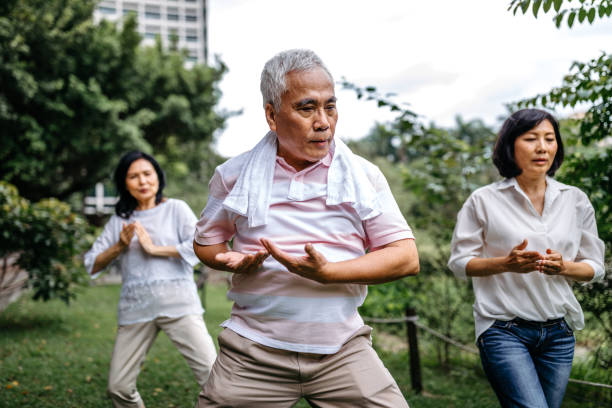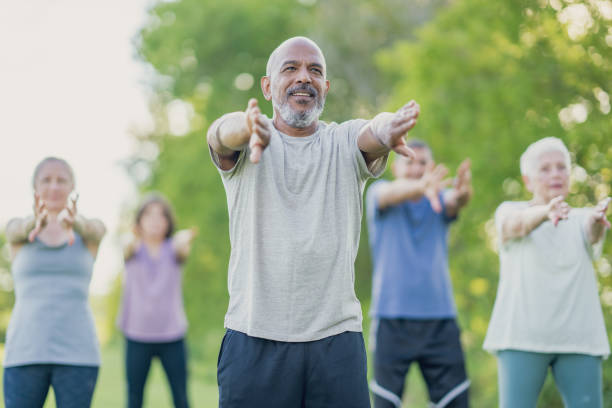Tai Chi, often referred to as “meditation in motion,” is a centuries-old Chinese martial art known for its slow, graceful movements and deep focus on breathing. As a practice that emphasizes balance, flexibility, and mental clarity, Tai Chi has gained popularity among seniors seeking to enhance their overall well-being. Its low-impact nature accommodates a wide range of physical abilities, making it an ideal form of exercise for individuals looking to improve their health without the strain that comes with more rigorous workouts. This gentle practice fosters physical strength and nurtures a sense of inner peace, contributing to a vibrant and fulfilling lifestyle in the golden years.
Contents
The Multifaceted Benefits of Tai Chi for Seniors
Tai Chi offers a holistic approach to wellness, combining physical exercise with mental relaxation. This unique discipline promotes bodily strength, flexibility, mental sharpness, and emotional balance.
Physical Health Improvements
Tai Chi provides numerous physical health benefits that are especially valuable for seniors. The slow, fluid movements help to enhance flexibility and range of motion in joints, reducing the risk of injury and promoting better overall posture. Regular practice can lead to improved balance, significantly lowering the chances of falls—one of the most common concerns for older adults.
Mental Clarity and Focus
In addition to its physical benefits, Tai Chi serves as a powerful tool for mental clarity. The emphasis on deep, mindful breathing and concentrated movements allows practitioners to calm their minds and reduce stress. Many seniors who practice Tai Chi report heightened concentration and improved cognitive function, which can be particularly beneficial in combating age-related decline.
Emotional Well-being
Tai Chi also nurtures emotional health by promoting a sense of community and connection among practitioners. Group classes facilitate social interaction, combating feelings of isolation that some seniors may experience. The meditative component of Tai Chi fosters a sense of inner peace, helping to alleviate symptoms of anxiety and depression, ultimately contributing to a more positive outlook on life.
The Broader Impact of Tai Chi on Life Quality
Tai Chi is more than just a physical exercise; it embodies a holistic approach to wellness that can significantly enhance the quality of life for its practitioners. By integrating movement, mindfulness, and social interaction, Tai Chi fosters a comprehensive sense of well-being.
Social Connectivity
One of Tai Chi’s notable benefits is its ability to foster social connections among participants. Many seniors find joy in attending classes or community groups where they can share experiences and build friendships. These social bonds not only enhance the practice’s enjoyment but also contribute to improved mental health, helping to alleviate feelings of loneliness and isolation.
Increased Mindfulness
Practicing Tai Chi encourages mindfulness, as participants must focus on their movements and breathing. This mindfulness practice promotes greater awareness of one’s body and surroundings, improving emotional regulation and stress management. As seniors incorporate these principles into their daily lives, they may find more opportunities for relaxation and contentment amidst everyday challenges.
Enhanced Quality of Life
Ultimately, the cumulative effects of Tai Chi—physical, mental, and emotional—contribute to an enhanced overall quality of life. Seniors who engage regularly in this practice often report greater vitality, increased happiness, and a stronger sense of purpose. As a gentle yet effective form of exercise, Tai Chi empowers individuals to take an active role in their health and well-being, promoting longevity and a fulfilling lifestyle.
Benefits of Tai Chi for Seniors

Tai Chi, an ancient Chinese martial art, offers numerous health benefits, particularly for seniors seeking to enhance their well-being. This low-impact practice combines slow, deliberate movements with deep breathing and mental focus, making it accessible regardless of fitness level.
Improved Balance and Coordination
Tai Chi emphasizes explicitly slow, controlled movements, which can significantly enhance balance and coordination. As seniors practice these fluid motions, they develop more excellent stability, reducing the risk of falls—one of the most common health concerns for older adults. The practice encourages body awareness and spatial orientation, essential skills for maintaining independence.
Stress Reduction
Engaging in Tai Chi also serves as an effective stress-relief strategy. The combination of deep breathing and intentional movement creates a meditative practice that calms the mind and reduces tension. Many participants report feeling a sense of tranquility and decreased anxiety levels after their sessions, contributing to an overall sense of well-being.
Flexibility and Joint Health
Regular practice of Tai Chi helps improve flexibility and joint health, which is crucial for seniors. The gentle stretching involved in Tai Chi can alleviate stiffness and discomfort, allowing for a better range of motion. This increased flexibility not only enhances daily activities but also supports longevity in mobility, allowing individuals to remain active and engaged in their communities.
Conclusion
Tai Chi offers an array of health benefits for seniors, making it a valuable addition to any wellness routine. Its low-impact nature and adaptability make it accessible to individuals of all fitness levels, providing a safe and enjoyable exercise option. Whether seeking improved balance, stress reduction, or joint health, Tai Chi can benefit seniors in their pursuit of overall well-being.
